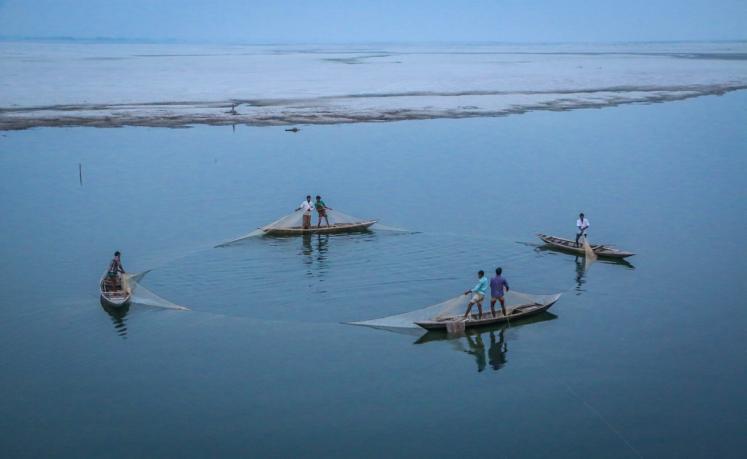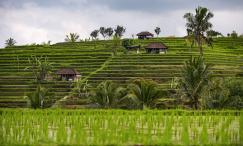This side event at the UN Biodiversity Conference (CBD COP 16) will highlight how collaboration among multiple stakeholders can drive innovative and sustainable solutions to address local needs and priorities while advancing global biodiversity goals. The event will introduce practical mechanisms and tools, and showcase examples of stakeholders working together at landscape and seascape scales to negotiate differing perspectives and priorities. Presentations will be followed by a panel discussion featuring representatives from governments, international organizations, civil society and academia, who will share insights on strengthening collaboration to support on-the-ground initiatives for building societies in harmony with nature.
Participation
The side event is open to attendees of CBD COP 16. It will be held in Mavecure — Business and Industry Organizations meeting room, Plaza One.
Please note that participants in UNU events may appear in photography, screen captures, videos and/or audio. For further information please refer to Events.
Programme
Contents of programme are subject to change.
Welcome Remarks
Tsunao Watanabe (Director, IPSI Secretariat / Visiting Research Fellow, UNU-IAS)
Fumiko Nakao (Principal Coordination Officer, Secretariat of the Convention on Biological Diversity)
Yutaka Matsuzawa (Vice-Minister, Global Environmental Affairs, MOEJ) (TBC)
Presentations
The Satoyama Initiative and Peer Learning on Landscape Approaches by Maiko Nishi (Research Fellow, IPSI Secretariat / UNU-IAS)
Supporting On-the-ground Initiatives through Satoyama Development Mechanism (SDM) by Koji Miwa (Policy Researcher, Biodiversity and Forest Area, IGES) (TBD)
It Takes a Landscape Approach to Live in Harmony with Nature: Collaborative Lessons Learned from the Saisiyat Journey of Indigenous Stewardship and Co-management Partnerships by Chih-you Ken (Board Chair, Miaoli County Saisiyat Indigenous Peoples Forestry and Worker Limited Liability Cooperative / Society for Wildlife and Nature (SWAN) International), Li-Hsin Hsieh (Section Chief, Forestry Planning and Management, Forestry and Nature Conservation Agency, Hsinchu Branch / SWAN International) and Paulina G. Karim (Postdoctoral Researcher, National Dong Hwa Univerity / SWAN International
Integrating Sustainable Production and Biodiversity Conservation for Societies in Harmony with Nature in Colombia by Andrés Quintero Angel (CEO, Corporación Ambiental y Forestal del Pacífico (CORFOPAL))
Panel Discussion — How to strengthen multi-stakeholder collaboration and effectively support on-the-ground initiatives for realizing societies in harmony with nature and contributing to the implementation of the Kunming-Montreal Global Biodiversity Framework (GBF).
Moderator: Maiko Nishi (Research Fellow, IPSI Secretariat / UNU-IAS)
Panellists:
Mrinalini Rai (Founder & Director, Women4Biodiversity)
Christian Schwarzer (Founder, Global Youth Biodiversity Network (GYBN))
Abigail Kitma (Program Staff, Climate and Biodiversity Program, Tebtebba)
Nagin Navirak (National Coordinator Cambodia, GEF Small Grants Programme, UNDP)
Ana Beatriz Barona (National Coordinator Colombia, GEF Small Grants Programme, UNDP)
Bopreang Ken (Director, Department of Biodiversity, General Directorate of Policy and Strategy, Ministry of the Environment of Cambodia)
Ministry of the Environment, Japan (TBC)
Organizers
The event will be co-organized by UNU-IAS, the International Partnership for the Satoyama Initiative (IPSI), the Institute for Global Environmental Strategies (IGES), the Ministry of the Environment, Japan (MOEJ), CBD Secretariat, Tebtebba, Global Youth Biodiversity Network (GYBN), Ministry of Environment, Cambodia and Women4Biodiversity (W4B).
Background
On-the-ground efforts in biodiversity conservation and sustainable use within productive landscapes and seascapes are essential for achieving the 2050 Vision for Biodiversity of the Convention on Biological Diversity. A whole-of-government and whole-of-society approach is key to facilitating these efforts and contributing to the success of the Kunming-Montreal Global Biodiversity Framework (GBF).
Since 2010, the International Partnership for the Satoyama Initiative (IPSI) has been a global platform that promotes synergies in diverse initiatives aimed at "realizing societies in harmony with nature." IPSI collaborates with partners such as national and local governments, NGOs, Indigenous Peoples and local communities, businesses, academia, intergovernmental organizations and youth groups. Through these partnerships, IPSI has developed mechanisms and tools to support on-the-ground initiatives, including the IPSI Collaborative Activities, the Satoyama Development Mechanism (SDM), Indicators of Resilience, the Satoyama Initiative Thematic Review (SITR) and the Community Development and Knowledge Management for the Satoyama Initiative (COMDEKS) programme.






